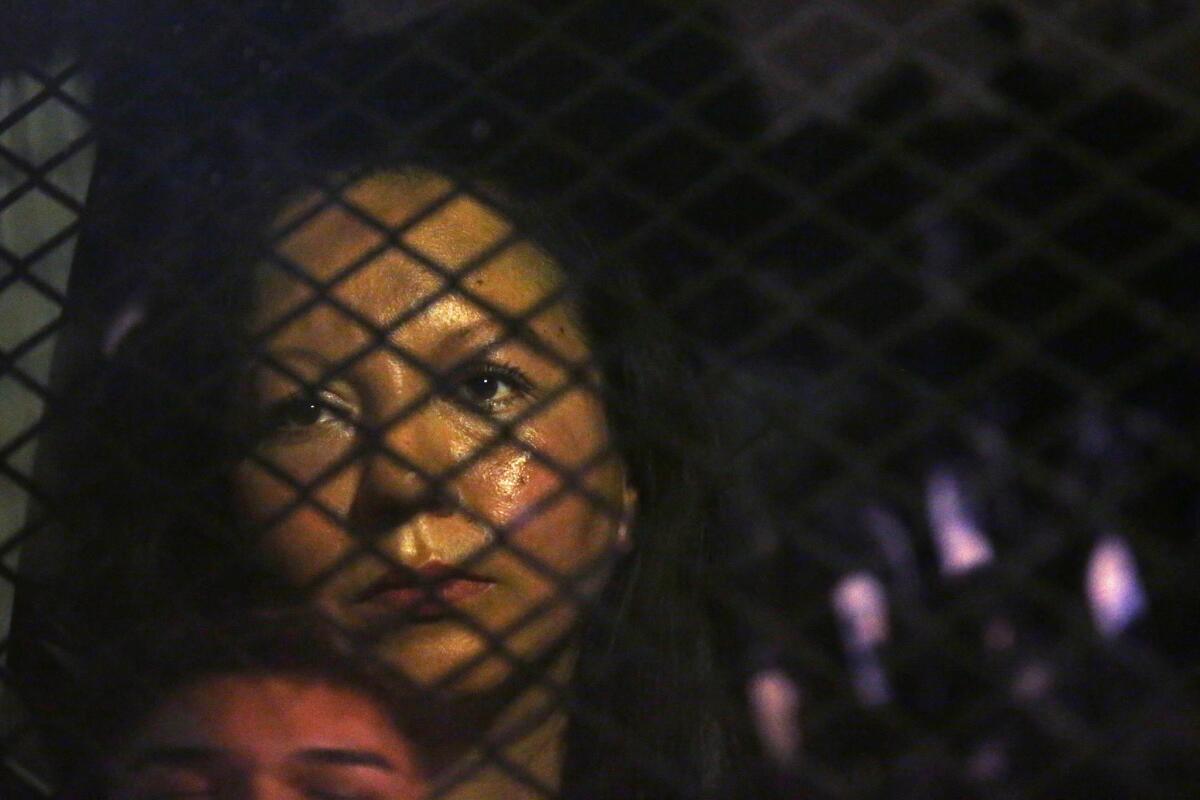Fearing deportations, Mexico warns its citizens in the U.S.

- Share via
Reporting from Mexico City — The much-publicized deportation of an immigrant who had been living illegally in Arizona prompted the Mexican government on Friday to urge its nationals in the United States to “take precautions” amid a “new reality” for the immigrant community.
The expulsion of Guadalupe Garcia de Rayos, a Mexican citizen and mother of two U.S.-born children, “illustrates the new reality of the Mexican community living in the United States in the face of more severe application of migration controls,” the Ministry of Foreign Affairs said in a statement.
The ministry urged its citizens to “stay informed about immigration matters”’ and keep in touch with the extensive Mexican consular network in the United States.
However, Mexican authorities acknowledged there is little they can do to slow deportations or counter other get-tough immigration policies of President Trump.
Trump’s threats to step up deportations and his vow to build a wall along the U.S.-Mexico border have caused widespread indignation in Mexico — and stirred up anti-U.S sentiments that had been mostly dormant.
Mexican authorities, not wanting to be viewed as compliant to the new U.S. administration, have vowed to boost aid to migrants and returning deportees in a bid to show solidarity with them. Critics have long said such aid was inadequate.
A “Respect for Mexico” protest march assailing Trump’s Mexico agenda is scheduled for Sunday in Mexico City. Tens of thousands are expected to participate.
In recent weeks, Mexican politicians have been photographed visiting Mexican communities in the United States or deportees arriving from the north.
President Enrique Peña Nieto met at the Mexico City airport this week with deportees who had just been expelled from the U.S.
The president, who had been suffering from record low approval ratings, saw a slight spike in support last month after he cancelled a planned meeting with Trump in Washington, rebuffing the White House insistence that Mexico pay for the proposed border wall.
Garcia de Rayos, 36, was deported Thursday, a day after she reported in to the U.S. Immigration and Customs Enforcement office in Phoenix for what her attorney said was supposed to be a routine “check in” regarding her ongoing deportation case.
Her subsequent detention and deportation sparked protests and made headlines in both the United States and Mexico.
While immigrant rights activists and others denounced her removal, advocates of stricter immigration controls applauded the move.
Once deported, Garcia de Rayos met with friends and supporters in the Mexican border city of Nogales, in Sonora state.
“She’s with her kids right now,” said Lucia Sandoval of the immigration advocacy group Puente Arizona. “Then she goes south.”
Garcia de Rayos was reared in a small Mexican town a 20-hour drive from the U.S. border. Her children, both U.S. citizens, were due to return from Nogales on Friday and rejoin their father, who remains in Phoenix.
From the age of 14, Garcia de Rayos lived in the United States. She was arrested in a workplace enforcement immigration raid in 2008 and convicted of felony identity theft for having false papers she had used to secure work.
It was that felony conviction that ultimately led to her deportation. The Trump administration has said it plans to focus its immigration crackdown on so-called “criminal aliens.”
In a statement, U.S. immigration officials said Garcia de Rayos’ case “underwent review at multiple levels of the immigration court” and that she was found to have no legal basis to remain in the United States.
Officials depicted the case as a routine enforcement matter, but it has fueled anxiety in immigrant communities nationwide.
In Austin, Texas, the teachers’ union Education Austin on Friday sent union members a flier with a section called “What to do if ICE comes to your door.”
The flier recommends against speaking with ICE agents or allowing them entry. “Do not open doors,” the flier reads. “Stay silent.
Jacob Barrett, a district spokesman, said Friday that some teachers may have distributed the fliers to students.
Staffers at some district campuses decided that the flier did not constitute advocacy, and were therefore permissible for teachers to distribute. Overt advocacy, Barrett said, such as religious proselytizing or political speech, could lead to discipline, but the staff felt that the flier was instead informational in nature.
McDonnell reported from Mexico City and Duara from Bisbee, Ariz.
ALSO
White House is considering a new, narrower travel ban, officials say
Analysis: Appeals court ruling a reminder of how Trump can pose a threat to his own goals
Immigration arrests in L.A. spark fear and outrage, but officials say they are routine
UPDATES:
4:25 p.m.: This article was updated to report developments in Austin, Texas.
This article was originally published at 1:30 p.m.
More to Read
Sign up for Essential California
The most important California stories and recommendations in your inbox every morning.
You may occasionally receive promotional content from the Los Angeles Times.













